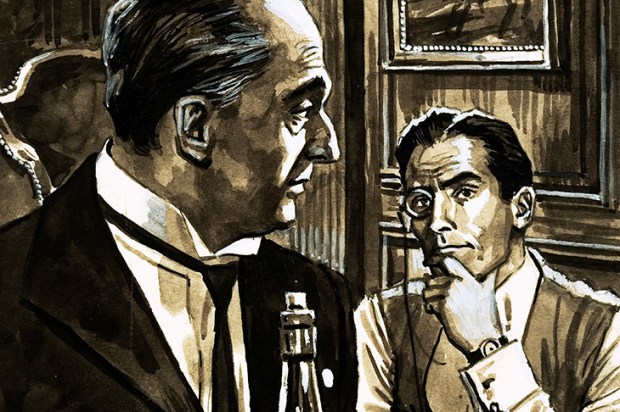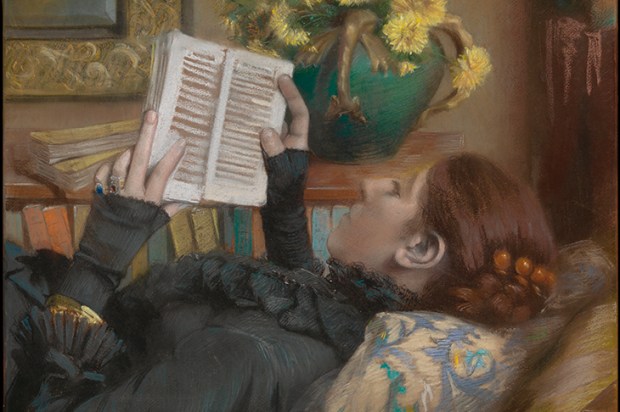Shakespeare’s Rape of Lucrece is a puzzling and often terrible poem. Lucrece, the devout wife of Collatine, is raped by Tarquin, the son of the king of Rome. Her suffering inspires a revolution led by Brutus, and this is the beginning of the first Roman republic. It’s a rich myth of sex and politics, and Lucrece’s (or Lucretia’s) story was told by Ovid and painted by Rembrandt. Shakespeare returns to the episode in several plays, notably Cymbeline. But in the poem, written in early 1594, he apparently struggles to find the emotion and drama. Perhaps he was simply young; this was early in his career, and he is still learning. Perhaps it was too pragmatic; the poem is an attempt to secure aristocratic patronage from the Earl of Southampton. At almost 2,000 lines, it’s just too long. ‘As a human drama, it fails to arouse our sympathy,’ writes Clare Asquith in her new book about the poem, and describes it as ‘exhausting’ and ‘far from erotic’.
Now, here’s the twist. As Asquith argues in her latest book, Shakespeare and the Resistance, Rape of Lucrece isn’t really a poem: it’s a political pamphlet, and the rape isn’t really a rape. With considerable ingenuity, she presents Shakespeare’s poem as a coded account of the Act of Supremacy of 1534 and the destruction of old Catholic England by the wicked Protestants, lined up under Elizabeth I’s machiavellian adviser Lord Burghley. The poem’s violence and grief are allegories for the destruction of monastic libraries; the selling off of land and artworks; the burning and breaking of stained glass and church decorations; and perhaps most of all, the tearing up of the old charitable almshouses, and their property being given to the rich. The victim Lucrece is presented as a ‘Shakespearean evocation of the numinous spirit of England, marked by inner conflicts held in precarious equipoise’.
Asquith’s strengths as a literary historian are her sense of urgency and her deep scholarliness. Very few literary critics write about Shakespeare’s narrative poems, and she does so with diligence and serious-mindedness. Her work is a corrective to the sentimental idea that Shakespeare was an apolitical genius who floated free from the history of his moment. Her wider project, here and in her previous book Shadowplay, is to track the repressed Catholic literary imagination through the literature of 16th-century England, and this is a welcome one. It is also the impetus behind many fine and distinguished studies, including Eamon Duffy’s The Stripping of the Altars and John Carey’s John Donne: Life, Mind, and Art. Oddly, neither of these are mentioned in Asquith’s bibliography.
The paradoxical achievement of Shakespeare and the Resistance is to make the poem more interesting by making it less interesting. Asquith’s argument is a little airless. She is cooly uninterested in Shakespeare’s life or his plays, or the life in those plays, or even the few traces of life in the poem which is her subject.
A single example: close to the end of the poem, Lucrece’s father Lucretius stands over the corpse of his daughter. ‘Poor broken glass,’ he declares: ‘I often did behold,/ In thy sweet semblance my old age born anew.’ Now Collatine, who has until this moment been silent, is stirred to grief. ‘At last it rains,’ writes Shakespeare in a startlingly lovely line: ‘Then son and father weep with equal strife/ Who should weep most, for daughter or for wife.’
For Asquith, this is ‘an odd family quarrel’. As the husband and father compete over who has the right to mourn her more — ‘She’s mine,’ ‘’tis mine’ — Asquith declares ‘the effect is absurd.’ She insists that men don’t really grieve in this undignified way, so there must be an allegory here, and what this moment is really about is ‘the pamphlet war between the Catholic and Protestant leaders over which church displayed the theological “marks” of the true Spouse of Christ’.
We might, however, see this as a moment of dazzling psychological realism and insight. Men grieve competitively, Shakespeare is saying; and that is one strand of the tragedy. While he was writing Rape of Lucrece, Shakespeare was probably also at work on Romeo and Juliet, and precisely this scene resurfaces in the play, as at the end the two fathers stand over the corpses of their children and quibble over who will mourn them better. Then in Hamlet, written five or six years later, Hamlet and Laertes argue at Ophelia’s grave over who has the truer grief. ‘I loved Ophelia,’ Hamlet declares, above her grave: ‘Forty thousand brothers/ Could not with all their quantity of love/ Make up my sum.’
It is hard, at this distance, not to be grateful for a remarkable choice Shakespeare made in 1594 and 1595. Faced with a possible career as either poet or playwright — or between writer for aristocratic patronage or writer for the popular stage — he chose the latter, and we are all the richer for it.
Got something to add? Join the discussion and comment below.
Get 10 issues for just $10
Subscribe to The Spectator Australia today for the next 10 magazine issues, plus full online access, for just $10.
You might disagree with half of it, but you’ll enjoy reading all of it. Try your first month for free, then just $2 a week for the remainder of your first year.

![The Earl of Southampton, to whom Shakespeare dedicated ‘The Rape of Lucrece’. [Getty]](https://www.spectator.com.au/wp-content/uploads/2018/11/The_Earl_of_Southampton.jpg?w=730&h=486&crop=1)


![The China-Russia East Route pipeline under construction in 2017. At 3,968 km in length, it is designed to carry 38 billion cubic metres of natural gas from Russia’s Far East to Shanghai. [Getty]](https://www.spectator.com.au/wp-content/uploads/2018/11/Pipeline.jpg?w=620)









Comments
Don't miss out
Join the conversation with other Spectator Australia readers. Subscribe to leave a comment.
SUBSCRIBEAlready a subscriber? Log in